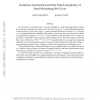Free Online Productivity Tools
i2Speak
i2Symbol
i2OCR
iTex2Img
iWeb2Print
iWeb2Shot
i2Type
iPdf2Split
iPdf2Merge
i2Bopomofo
i2Arabic
i2Style
i2Image
i2PDF
iLatex2Rtf
Sci2ools
SODA
2016
ACM
2016
ACM
Incidence Geometries and the Pass Complexity of Semi-Streaming Set Cover
Set cover, over a universe of size n, may be modelled as a data-streaming problem, where the m sets that comprise the instance are to be read one by one. A semi-streaming algorithm is allowed only O(n poly{log n, log m}) space to process this stream. For each p 1, we give a very simple deterministic algorithm that makes p passes over the input stream and returns an appropriately certified (p + 1)n1/(p+1)-approximation to the optimum set cover. More importantly, we proceed to show that this approximation factor is essentially tight, by showing that a factor better than 0.99 n1/(p+1)/(p + 1)2 is unachievable for a p-pass semi-streaming algorithm, even allowing randomisation. In particular, this implies that achieving a Θ(log n)approximation requires Ω(log n/ log log n) passes, which is tight up to the log log n factor. These results extend to a relaxation of the set cover problem where we are allowed to leave an ε fraction of the universe uncovered: the tight bounds on the best app...
Algorithms | SODA 2016 |
| Added | 09 Apr 2016 |
| Updated | 09 Apr 2016 |
| Type | Journal |
| Year | 2016 |
| Where | SODA |
| Authors | Amit Chakrabarti, Anthony Wirth |
Comments (0)

